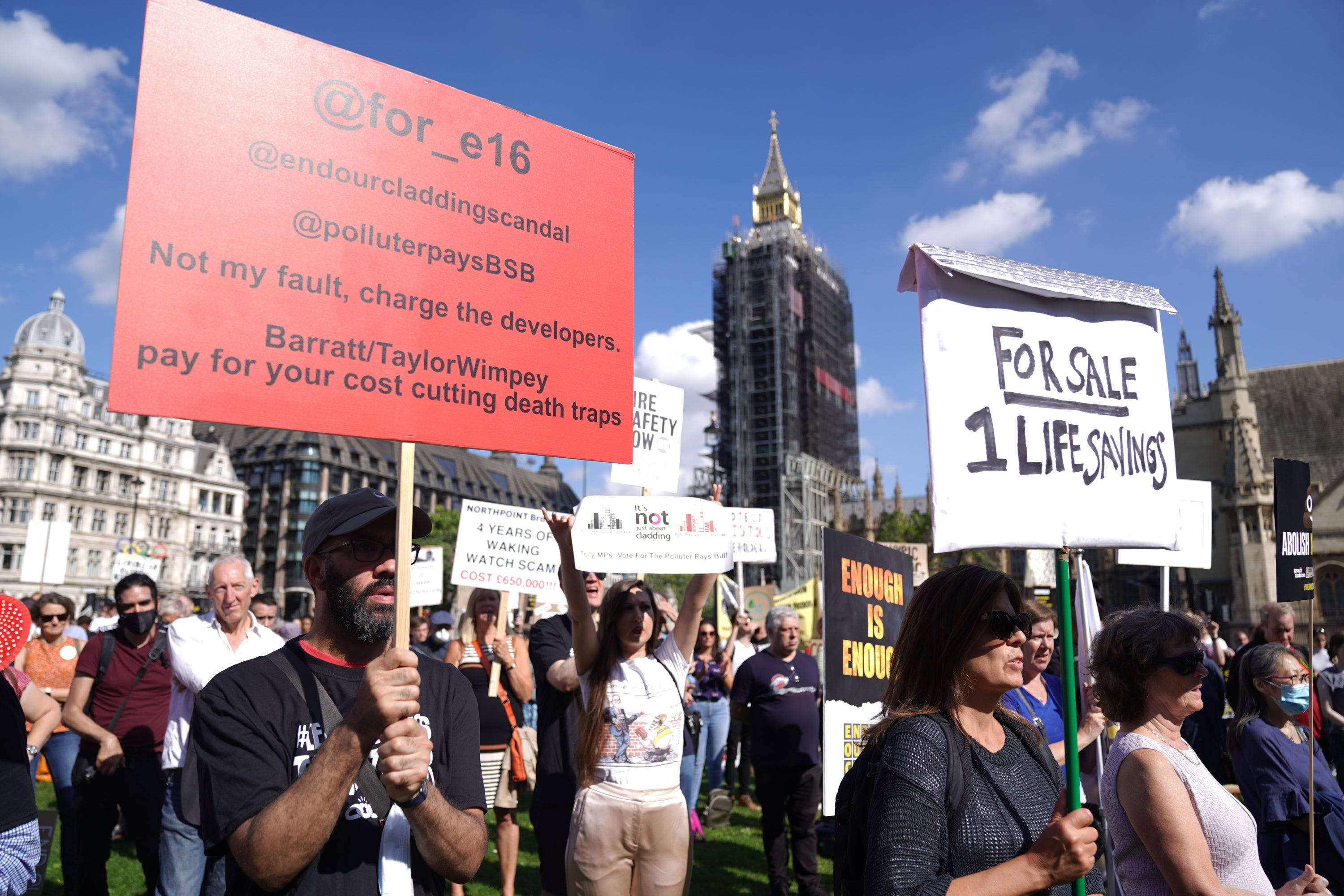Thousands more flat owners could be spared cost of removing dangerous cladding
Michael Gove could use ‘high-level threat of tax or legal solutions’ to force developers to pay up to £4bn, leaked letter suggests

Your support helps us to tell the story
From reproductive rights to climate change to Big Tech, The Independent is on the ground when the story is developing. Whether it's investigating the financials of Elon Musk's pro-Trump PAC or producing our latest documentary, 'The A Word', which shines a light on the American women fighting for reproductive rights, we know how important it is to parse out the facts from the messaging.
At such a critical moment in US history, we need reporters on the ground. Your donation allows us to keep sending journalists to speak to both sides of the story.
The Independent is trusted by Americans across the entire political spectrum. And unlike many other quality news outlets, we choose not to lock Americans out of our reporting and analysis with paywalls. We believe quality journalism should be available to everyone, paid for by those who can afford it.
Your support makes all the difference.Thousands more flat-owners could be spared the cost of removing dangerous cladding from their buildings under new government plans to coerce developers into shouldering the expense, according to a report.
Currently only leaseholders in buildings taller than 18 metres – or those with at least six storeys – are able to access grants to replace cladding, introduced after the Grenfell Tower fire claimed 72 lives in June 2017 and exposed a safety crisis in properties across the country.
With people in buildings below that height facing the prospect of taking out large and costly loans to replace the flammable materials, often while struggling to sell properties that have depreciated in value since the Grenfell tragedy amid soaring insurance costs, the cut-off point for this funding has been heavily criticised by campaigners and experts.
In November, just weeks after assuming the role of housing secretary, Michael Gove announced that he was “pausing” plans for a loan scheme proposed under his predecessor Robert Jenrick, questioning why, as “innocent parties”, leaseholders should be forced to foot the cost of replacing the cladding.
Now, a leaked Treasury letter suggests that Mr Gove will seek to force property developers to pay up to £4bn towards replacing cladding in buildings between 11 and 18 metres tall.
Loans for these buildings will be replaced by a “limited grant scheme”, according to the letter to Mr Gove from the chief secretary to the Treasury, Simon Clarke, reported by BBC Newsnight on Friday.
“You may use a high-level ‘threat’ of tax or legal solutions in discussions with developers as a means to obtaining voluntary contributions from them,” the letter said.
Stating that “the taxpayer should not be on the hook for further costs of remediation”, Mr Clarke’s letter said that his approval of the new package of measures, which Mr Gove will reportedly announce next week, was conditional on the fact that no new Treasury funding will be made available for the work.
Instead, if Mr Gove is unsuccessful in persuading developers to pay for the costs, existing housing budgets should be used as a “backstop” for funding the proposals, Mr Clarke reportedly said, warning that, in the event that insufficient funds are raised from developers, “safety should be prioritised over supply”.
A Commons select committee report in 2020 placed the cost of fixing only the tallest buildings at £15bn – triple the amount currently proposed in the government’s building safety fund.
According to the BBC, property developers have previously argued that they are not liable for the cost of removing cladding because they followed building regulations at the time of construction.
A separate report in the Telegraph on Friday night also appeared to corroborate the BBC’s. It quoted a Whitehall source as warning that there would be “commercial consequences” for developers that failed to respond to the government’s new campaign – with a new team being formed to publicly name and shame firms.
A spokesman for the End Our Cladding Scandal campaign welcomed the reported plans as “a welcome step in the right direction”, but warned that “there’s still a long road to travel”.
With the Treasury’s letter saying the measures do not “extend to non-cladding” costs, he said the “devil is in the detail”, adding: “It's not definite still if we are getting to the destination we want to get to, but we are cautiously optimistic.”
A Ministry of Housing, Communities and Local Government spokesperson told The Independent the department was not commenting at this stage.
Additional reporting by PA
Join our commenting forum
Join thought-provoking conversations, follow other Independent readers and see their replies
Comments